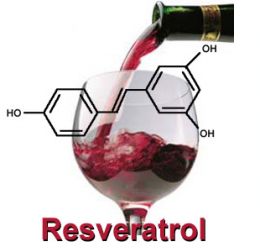Resveratrol A Anti Aging
 In 2003 a study, Howitz and Sinclair published a report in the journal Nature, that demonstrated resveratrol significantly extended the life span of the Saccharomyces cerevisiae yeast.
In 2003 a study, Howitz and Sinclair published a report in the journal Nature, that demonstrated resveratrol significantly extended the life span of the Saccharomyces cerevisiae yeast.
Studies also later revealed that the life span of the worm Caenorhabditis elegans and fruit fly Drosophila melanogaster
were also prolonged, and in 2007 a third study group also managed to
increase the life span of and Caenorhabditis elegans worm.
It was only in 2006 however, that scientific trials were successful carried out on a vertebrate. The Nothobranchius furzeri,
a fish with a generally short life span of approximately nine weeks
was found to have its life span extended by up to 56% when administered a
maximum dose of resveratrol.
When compared with the
controlled fish, the fish supplemented with resveratrol demonstrated
improved learning to negotiate unpleasant stimulus, as well as extended
higher swimming activity. Italian scientists conducting these trials
also noted a marginal increase in morality among young fish and
suggested that it was due to its weak toxic action that triggered the
fishes defense mechanisms that delivered life extension.
Obviously human testing poses obvious difficulties but matters are
currently underway by the pharmaceutical giant, Galxo Smith Kline,
producers of Xenical and Alli, who recently purchased the resveratrol
patent, to develop the most effective treatment so these results can
therefore be replicated.
However it's not just life extension
qualities that this polyphenol can offer. Later in 2006 a Howitz and
Sinclair report also claimed that resveratrol counteracted the
detrimental effects of a high fat diet in mice. Additionally, by
adding hydrogenated coconut oil to regular diet, it provided 60% energy
from fat and the mice on resveratrol ingested approximately 30% more
calories than those on the regular diet.
 Results
then demonstrated that with both mice fed the regular diet and a high
fat diet with one group also consuming 22mg/kg of resveratrol, those
on resveratrol showed a lower risk of death than the mice just fed the high fat diet.
Results
then demonstrated that with both mice fed the regular diet and a high
fat diet with one group also consuming 22mg/kg of resveratrol, those
on resveratrol showed a lower risk of death than the mice just fed the high fat diet.
Both insulin and glucose levels on the mice on a high fat +
resveratrol diet were also monitored to be be closer to the levels of
mice on a regular diet as opposed to those on a high fat diet, and a
further study by Howitz and Sinclair had a range of additional health
benefits on elderly mice, but when this diet was started in their
mid-life, results however proved less beneficial.
This may
suggest why communities who consume resveratrol on a daily basis, most
notably the people of Okinawa and Sardinia, currently hold the largest centenarian populations in the world per capita,
with additional enviable statistics where the elderly in these two
communities also work well into their nineties, with many off the
western illness, most famously cancer, remaining almost unheard of in
both these regions.
So whilst the FDA has yet to approve this
anti-oxidant supplement as a longevity product in the U.S., it is
clear that resveratrol does however possess life battling qualities that
if accompanied with a healthy lifestyle, could potentially help humans
extend there life span whilst also being beneficial to individuals who
are overweight, and/or who suffer from high insulin and/or high glucose
levels.


